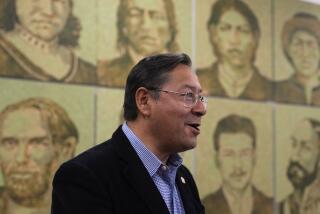Some Bolivians Fear Return of Ex-Dictator : South America: Garcia Meza is expected to blow the whistle on former cronies, collaborators.
- Share via
LA PAZ, Bolivia — The expected extradition of former dictator Luis Garcia Meza, under arrest in neighboring Brazil and wanted here to serve a 30-year prison sentence, could spell trouble for some Bolivians.
Brazilian police arrested Garcia Meza in Sao Paulo on March 11. Since then, Bolivia has been abuzz with speculation that the returning fugitive may incriminate many people who collaborated with his 1980-1981 regime.
“There are a lot of people sweating bullets,” said a foreign diplomat in La Paz. “I think a lot of people were hoping he would never be found.”
When the Supreme Court began its trial for Garcia Meza in 1986 for a long list of crimes, he was free on his own recognizance. But when the court ordered his arrest in January, 1989, he went into hiding.
Before and after his conviction in absentia last year, it was common knowledge that Garcia Meza moved quietly around Bolivia and took trips abroad with false documents.
“There were more sightings of Garcia Meza than Elvis Presley,” the diplomat said.
Garcia Meza’s capture has been hailed as a strong signal that military coups and dictatorial abuses will no longer go unpunished in Bolivia.
Bringing more of his former collaborators and later protectors to justice would reinforce the message.
But paradoxically, some analysts said, it might also destabilize Bolivia’s democracy by stirring up political and military unrest.
According to “sightings” late in 1993, the former army general had taken up residence in Sao Paulo.
The information was confirmed by an informant for the U.S. Drug Enforcement Administration in Brazil, the diplomat said.
He said the DEA passed the information to Brazilian federal police, who tracked the fugitive down and arrested him in an apartment that he had moved into recently.
When Brazilian authorities presented Garcia Meza to reporters after his arrest, he said he had been writing a book that will be “a bomb,” revealing names of people who were secretly involved in his 1980 coup.
Bolivian officials say a key tip on Garcia Meza’s presence in Sao Paulo came from a Bolivian woman living there. The woman wrote to German Quiroga, the Bolivian minister of government, saying she had spotted the general jogging in a Sao Paulo park with bodyguards. Quiroga said he passed the information on to the U.S. Embassy in La Paz.
Quiroga has told reporters that the woman deserves a $220,000 reward that had been offered by the Bolivian government for information leading to Garcia Meza’s arrest. But there is a problem in paying the reward: The letter-writer identified herself only with initials.
Garcia Meza seized power in a violent coup in July, 1980, that reportedly was backed by neo-fascists and drug traffickers.
During the 13-month regime, notoriously brutal and corrupt, at least 50 people were killed and 22 others disappeared after being arrested.
The former dictator and 43 officials of his regime were convicted last April of crimes including genocide, murder, sedition and corruption.
Ten of those convicted are now in Bolivian prisons. About 10 are still fugitives, and others have won “conditional suspension” of short sentences.
Luis Arce Gomez, Garcia Meza’s interior minister, is serving a U.S. sentence for drug trafficking.
Congressman Juan del Granado said dozens of other Bolivians should be tried for crimes under the dictatorship. In Garcia Meza’s trial, Del Granado acted as an attorney representing Bolivia’s labor federation and families of victims. He asked for a second trial for 75 other people, but the Supreme Court ruled against it.
When Garcia Meza returns to Bolivia, he may try to incriminate past collaborators who have turned against him, Del Granado said in an interview.
“I think he will want to hurt people who took part in his government and now are with the democratic system,” Del Granado said.
More to Read
Sign up for Essential California
The most important California stories and recommendations in your inbox every morning.
You may occasionally receive promotional content from the Los Angeles Times.










